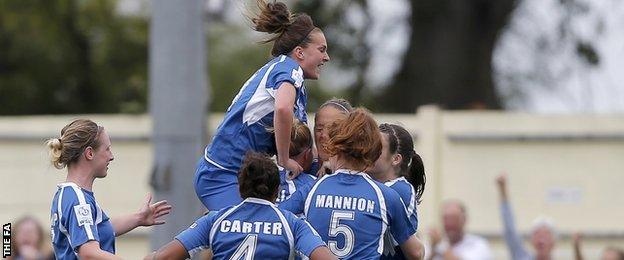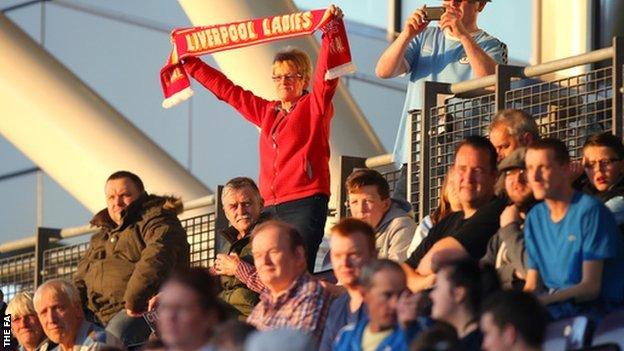Kelly Simmons: Emma Hayes will 'inspire more new female coaches'
- Published
Hayes will inspire coaches - Simmons
Chelsea Ladies manager Emma Hayes' success will encourage more women to pursue a coaching career, says Football Association director Kelly Simmons.
The only female boss in Women's Super League 1 this year, Hayes, 38, guided Chelsea to a league and FA Cup double.
"A number of England players who are coming towards the end of their career are getting their qualifications," Simmons told BBC Sport.
"I'm sure Emma's success will only inspire them further."
Simmons, director of participation and development at the FA, added: "The big difference now is that those players can see that there's a profession in coaching, that there's a career pathway.
Getting qualified |
|---|
Women's Super League clubs must have a UEFA 'A' licensed coach |
In July 2015, of the 1,379 'A' licensed coaches in England, 26 were female |
"The most important thing is that the women's game gets the best coaches, but it's also really important that we, and the clubs, develop more female coaches."
In addition to Hayes winning trophies with Chelsea, Kelly Chambers, currently the only other female manager in the top two tiers of English women's football, won promotion to WSL 1 with Reading this season.
'Sympathy for Bristol Academy'
Top WSL clubs' budgets shock Arnold
But going in the other direction to Chambers' Reading are Bristol Academy, who were relegated to WSL 2 last month.
Bristol chairman Simon Arnold said the money being invested by some Premier League clubs into women's teams made it very difficult for his club to compete, and he accused the FA of "replicating the men's game, with women playing it".
So with the top three in WSL 1 this season - Chelsea, Manchester City and Arsenal - mirroring the top three of the men's top flight in 2014-15, is English women's football losing some of its soul?
"I have sympathy with Bristol Academy's situation. We're trying to make sure that the league is sustainable," said Simmons.
"Ultimately, men's football clubs have got outstanding facilities - they are bringing so much to the game.
"We've got a salary cap - we review that every year with the clubs.
"What we've got to make sure is that the game stays competitive at that top level."
WSL getting 'better every year'

Birmingham City, who finished sixth in the league, knocked champions Chelsea out of the Continental Cup
In terms of the race for trophies, Simmons stressed that the WSL is proving itself to be extremely competitive.
"At the moment, the competitions are being shared out," she said. "It is not a one-club dominance.
"Last season three clubs could have won it on the last day, and this season, two clubs could have.
"It was really close and really exciting, and just shows how strong the league is.
"I think the league gets stronger every year. It was a very strong, competitive season."
Increased attendances 'will hold' in 2016
Highlights: Chelsea Ladies 4-0 Sunderland Ladies
On Monday, the FA announced that average attendances in WSL 1 had risen by 48% in 2015.
This increase was undoubtedly helped by England's performance at this summer's Women's World Cup in Canada, where the Lionesses finished third.
So could crowds decrease next year, in the absence of a major tournament involving England?
"We are averaging over 1,000 at every WSL 1 game, which is great, but obviously we want to build on that," said Simmons.
"There's no reason why attendances can't get to those sorts of figures in the future, for every game.
"We have moved the game significantly, and pretty quickly. We want to consolidate, and keep that, but how can we kick on?
"I think the crowds will hold. A World Cup break does give added profile but, next year, we'll have a good run at keeping the WSL in the spotlight right through the season."
Girls' football week: 5-11 October

Families with young children make up a significant proportion of Women's Super League crowds
As this season's WSL draws to a close, the FA hopes to turn that spotlight on to attempts to increase playing opportunities for girls during 'Girls' football week'.
Simmons revealed that participation in the event has more than quadrupled this year.
"The whole week is about getting more girls and women to play football," she said. "We are encouraging and supporting schools, colleges, universities and clubs to get girls through their doors.
"We're really pleased because the take-up has been fantastic. We've got over 16,000 girls and young women registered for the week. Last year, it was around 2,000.
"This year, we've expanded it to schools and clubs as well, so it's a real chance to get lots more girls and women playing football.
"We know from our research that girls want to play. We know there are less areas for girls to play than boys, particularly in primary and early secondary school, so that's been a targeted area for us."
- Published7 October 2015

- Published6 October 2015

- Published5 October 2015

- Published20 June 2016

- Published7 June 2019
